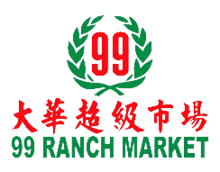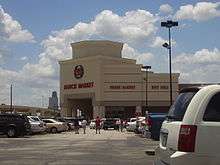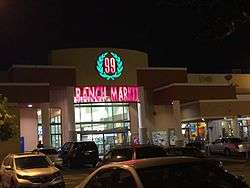99 Ranch Market
 | |
| Private | |
| Industry | Retail |
| Founded | 1984 (Westminster, California) |
| Founder |
Roger H. Chen Founder and CEO |
| Headquarters | Buena Park, California |
Number of locations | 43 |
| Products | Bakery, dairy, deli, frozen foods, grocery, meat, produce, seafood, snacks, liquor |
| Website | 99ranch.com |
| 99 Ranch Market | |||||||||||
| Traditional Chinese | 大華超級市場 | ||||||||||
|---|---|---|---|---|---|---|---|---|---|---|---|
| Simplified Chinese | 大华超级市场 | ||||||||||
| |||||||||||

99 Ranch Market is an Asian American supermarket chain owned by Tawa Supermarket Inc., which is based in Buena Park, California. 99 Ranch has over 30 stores, primarily in California, with other stores in Nevada, Washington, and Texas.
99 Ranch Market is one of the largest Chinese American supermarket chains in the United States. It is also considered a Taiwanese-American market because of the considerable amount of products imported from Taiwan and because the store was founded by Taiwanese-born American Roger H. Chen.
History

Roger Chen, a Taiwanese-born American, opened the chain's first location in 1984 in Little Saigon, a Vietnamese American community located in Westminster, California.[1][2][3] (now closed). In 1987, a second market was opened in Montebello (also now closed). It was originally called 99 Price Market but was eventually renamed 99 Ranch Market to give the supermarket a somewhat trendier name.
The name has led to some confusion. Some of the stores (especially in Southern California) are located in the same market area as the similarly named 99 Cents Only Stores, but nevertheless there is no relation between the two chains (99 Ranch Market specializes in Asian-American supermarket products while 99 Cents Only is a variety store that sells products at a price of 99 cents). Likewise, in Phoenix, Arizona there is a similarly named ethnic supermarket called "Pro's Ranch Market", but instead of selling Asian products it sells completely different Mexican products.[4][5]
Prior to 1998, all stores that were opened outside of California were done through franchisees. Except for a single store in Nevada, all of these franchises had either failed (Hawaii and Georgia), became independent (Indonesia), or both (Arizona).
In their first expansion outside of California, company owned stores were opened in the Seattle area at the Great Wall Shopping Center in 1998[6] and a second store at the Edmonds Shopping Center in 2003.[7]
Expanding into Texas, two company owned stores were opened near Houston in 2008[8] and 2009[9] while at third store was opened in the Dallas–Fort Worth metroplex in 2010.[10][11] A fourth store opened up in Katy, Texas in August 2016.[12] Another store is planned to open in Austin in early 2017.[13]
Over the years, 99 Ranch Market has developed into the largest Asian supermarket chain, with its own production facilities, including farms and processing factories. The chain is currently headquartered in Buena Park, California.
In addition to its American stores, it maintains its own production facilities in China and these company-owned plants have implemented quality control measures to ensure that products from China are compliant with Food and Drug Administration standards and regulations.
A franchise store was established in Atlanta at the Asian Square in 1993.[14][15] This store was unable to compete with more recently opened East Coast based chains like Super H Mart and closed in 2010.[16]
Beginning in 1993, 99 Ranch Market invested in a Chinese-Canadian supermarket chain called T & T Supermarket (大統華) along with Uni-President Enterprises Corporation of Taiwan and a group of Canadian investors headed by President and CEO Cindy Lee. T&T initially started stores in the Vancouver area, and then expanded throughout Canada and into Edmonton, Calgary and Toronto. 99 Ranch Market sold the T&T Supermarket chain to Loblaw Companies in 2009 for $225 million.[17][18]
In Phoenix, a franchise store was established by E&E Supermarkets in 1997 at the Chinese Cultural Center.[19] Unfortunately, this venture did not last long and E&E Supermarkets filed for bankruptcy in 1999 and the store was eventually closed.[20]
Another franchise store in Honolulu was established by Sunrise USA, Inc. in 1998 at the Moanalua Ethnic Village.[21] This store was closed in 2007.[22][23]
In 1997, PT Supra Boga Lestari established a franchise in Jakarta, Indonesia. After the May 1998 riots, PT Supra Boga Lestari decided it was best to break its ties with Tawa and become independent while using the names Ranch Market and Ranch 99 Market in Indonesia.[24][25][26][27]
Customer base
| 99 Ranch Market | |||||||||||||||
| Chinese name | |||||||||||||||
|---|---|---|---|---|---|---|---|---|---|---|---|---|---|---|---|
| Traditional Chinese | 大華超級市場 | ||||||||||||||
| Simplified Chinese | 大华超级市场 | ||||||||||||||
| Literal meaning | Great Chinese Supermarket | ||||||||||||||
| |||||||||||||||
| Vietnamese name | |||||||||||||||
| Vietnamese | Siêu Thị 99 Ranch | ||||||||||||||
Although most of its customers are ethnic Chinese Americans and Taiwanese Americans, shoppers also include recent immigrants from China, ethnic Chinese from Vietnam, and others. The chain sells a wide range of imported food products and merchandise from Hong Kong, Japan, China, Taiwan, Korea, and Southeast Asia (particularly Vietnam and Thailand). It also carries some domestic products made by Chinese American companies and a limited selection of mainstream American brands. In addition, it has also reached out to pan-Asian customers, especially Filipino Americans and Japanese Americans, by opening locations in areas predominantly populated by people of these two ethnicities.
Because 99 Ranch Market serves a predominantly Chinese American base, Mandarin Chinese serves as the lingua franca of the supermarket and its adjacent businesses. Taiwanese is also spoken as many employees are from Taiwan. In-store PA announcements announcing specials are multi-lingual and often spoken in English, Mandarin, Cantonese with certain stores also using Taiwanese and Vietnamese.
The name of the chain includes "99," a number considered lucky by ethnic Chinese. The number nine in Chinese sounds like the word for "long-lasting."[1]
The English slogan is "united at heart for a better future" and the Chinese slogan is "大華與您共創未來" (Dà Huá yǔ nín gòngchuàng wèilái "99 Ranch is creating the future together with you").[28]
General locations
Generally, the chain locates its stores in newer suburban Mandarin-speaking immigrant communities, such as Milpitas, California, where the supermarket is strategically located near the technology industries of the Silicon Valley which employ many Asian immigrants, and Irvine, California, where wealthy Taiwanese Americans settled during the 1990s.
Non-suburban locations tend to be located in multi-ethnic districts. For instance, the Van Nuys, California and Richmond, California stores are located in multi-cultural neighborhoods and are popular among African American, Mexican American, and white American customers, as well as Chinese-speaking customers.
Older Cantonese Chinese neighborhoods in California have not been as welcoming to the chain. The 99 Ranch in Los Angeles' Chinatown operated in the Bamboo Plaza area for several years, but eventually the store was closed, perhaps due to its obscure location and lack of parking space, and perhaps due to competition from local small grocers, who have maintained their popularity among elderly Chinese American shoppers.
Setting up in suburbia, 99 Ranch Market is often the only Asian American supermarket and shopping center for miles around. For instance, 99 Ranch Market is one of the very few Asian supermarkets operating in the San Fernando Valley.
Given the market chain's premium locations, the costs of rent for tenants are generally high, but other Chinese businesses, such as Sam Woo Restaurants, Chinese traditional medicine shops, and gift stores, have been known to follow 99 Ranch Market to its new locations, with 99 Ranch market becoming the anchor tenant for the smaller stores and restaurants within developing Asian suburban shopping areas. For example, in Phoenix, Arizona, the state's first 99 Ranch Market opened as part of a larger "COFCO Center" that offers a number of Asian restaurants and shops for the city and surrounding areas.[29][30]
Since 2008, 99 Ranch Market has opened locations in Texas, in particular Houston (2008),[8] Sugar Land (2009),[9] Plano (2010),[10] Carrollton (2016),[31] and Frisco (expected in 2017).[32] This is in response to the growing population of Asian-Americans in Texas in the 2000s.
Most 99 Ranch Markets are company-owned. The only franchised locations remaining in the United States are those in Las Vegas.[33]
Store layout and offerings
In design, 99 Ranch Market stores are similar to mainstream American supermarkets, with aisles that are wider and less cluttered than in most other Chinese markets. The supermarket accepts credit cards for totals above $5.00 whereas many markets in old Chinatowns do not. Also, a handful of 99 Ranch Market locations have an in-store branch of East West Bank, a major Chinese American bank.[34]
Most 99 Ranch Market locations have a full-service take-out deli serving a combination of Cantonese, Taiwanese, and Szechuan fare. Some of the delis in the markets also feature pre-cooked meats, such as Cantonese roast duck (huo ya) and barbecued pork (cha shao). These stores also have a bakery with cakes and fresh Chinese pastries, most of the bread products and pastries sold in the markets are made inside the store. The 99 Ranch locations that do not have delicatessens and/or bakeries simply operate as bare-bones markets.
99 Ranch Market used to operate a membership VIP card program, send out mail circulars with coupons, and promote some sweepstakes as well. All of these programs and promotions were discontinued in August, 2007, in favor of offering all customers the same price benefits. Although the chain remains successful and popular, prices are on average generally higher when compared to smaller non-chain Chinese groceries.
The chain also runs major advertising campaigns, including in-print ads in Chinese-language newspapers such as World Journal, television ads on ETTV America and TVB USA, and radio ads on Chinese-language radio in Southern California.
Competitors
In Southern California, 99 Ranch's main competitors are the Hong Kong Supermarket (established in 1981) and Shun Fat Supermarket (started in the mid-1990s) chains. These two supermarket chains tend to be located within close proximity of some 99 Ranch Market locations, especially in the predominantly Asian American neighborhoods of southern California.
In the San Francisco Bay Area, 99 Ranch Market's main competitors are the Marina Food and Lion Supermarket chains, as well as smaller and longer-established Cantonese Chinese grocery stores, such as those in Oakland's Chinatown and the Asian neighborhoods of San Francisco. In the Silicon Valley, 99 Ranch Market and Marina are complemented by a number of other large Asian supermarkets with various national-ethnic affiliations. These include Tin Tin (Chinese), Lion (Chinese), Mitsuwa (Japanese), and Han Kook (Korean) supermarkets.
In the Seattle metropolitan area, 99 Ranch Market competes with longer-established supermarket chains such as Uwajimaya, local Vietnamese supermarkets Viet Wah and Hop Thanh (HT Market), and suburban Korean supermarkets and groceries such as Paldo World and H Mart. The two stores in the Seattle area are located far from where most Taiwanese Americans live, and cater instead to mainland Chinese immigrants and Asians from other backgrounds.
References
- 1 2 Pellissier, Hank (May 21, 2011). "99 Ranch Market". New York Times. Retrieved June 26, 2011.
- ↑ Hamilton, Denise (April 27, 1997). "99 and Counting: Roger Chen's chain of Ranch Markets is growing by leaps and bounds, thanks to his cross-cultural strategy of offering traditional Asian foods in a Western-style setting". Los Angeles Times.
- ↑ Ganga, Maria (December 11, 1988). "Asian Lure for Anglos Growing Tawa Supermarket Chain Blueprints Expansion Beyond Its Ethnic Roots and Neighborhoods". Los Angeles Times. p. AM7. (subscription required (help)). Alternate Link via ProQuest.
- ↑ Hahnefeld, Laura (June 3, 2013). "Pro's Ranch Markets Files for Chapter 11". Phoenix New Times.
- ↑ Brown, Brandon (May 31, 2013). "Pro's Ranch Markets files for Chapter 11 bankruptcy". Arizona Republic.
- ↑ Kim, Nancy (September 14, 1997). "'Pan-Asian' mall planned in Kent; California developer to combine stores, restaurants in huge shopping center". Puget Sound Business Journal.
- ↑ Tice, Carol (November 3, 2002). "More local Kmart closures? Nine Washington stores on list of potential sites". Puget Sound Business Journal.
- 1 2 Dawson, Jennifer (October 12, 2008). "99 Ranch Market hitches Asian post to Houston with first store in Texas". Houston Business Journal.
- 1 2 Walsh, Robb (November 9, 2009). "99 Ranch Market Grand Opening". Houston Press.
- 1 2 Pierce, Kim (July 18, 2010). "Coming to Plano: So-Cal Asian supermarket". Dallas Morning News.
- ↑ Brock, Katherine Cromer (July 19, 2009). "Redevelopment attracts 99 Ranch Market". Dallas Business Journal.
- ↑ "99 Ranch Market Grand Opening in Katy". Katy Magazine. August 10, 2016.
- ↑ Dinges, Gary (May 16, 2016). "N. Austin center to get Asian market, conveyor belt sushi restaurant". Austin American-Statesman. Retrieved 16 May 2016.
- ↑ Zhao, Jianli (2002). Strangers in the City: The Atlanta Chinese, Their Community, and Stories of Their Lives. Psychology Press. p. 84. ISBN 9780815338031.
- ↑ Fay, Tim (December 2, 1993). "2 centers to debut for Asian Americans". Atlanta Journal-Constitution. p. A13. Alternate Link via NewsBank.
- ↑ Keng, Natalie (May 2011). "Eat, Shop & Explore: Asian supermarkets offer fresh, colorful delicious food". Atlanta INtown. 17 (5). p. 32. Alternate Link via Issuu.
- ↑ "Loblaw buying T&T Asian food chain". CBC News. July 24, 2009.
- ↑ "T&T Supermarkets sold to Loblaws Inc. for $225 million; Cindy Lee was a self-described housewife in 1993 when she opened her first Asian grocery store in Richmond". Vancouver Sun. July 25, 2009.
- ↑ Netherton, Martha (December 14, 1997). "In Sites: CBT wants Valley customer service center; Chinese grocery opens". Phoenix Business Journal.
- ↑ Gabriel, Angela (October 29, 1999). "99 Ranch Market stays open after new management steps in". The Business Journal. 19 (55). p. 5.
- ↑ "Mapunapuna shopping mall grows". Pacific Business News. March 15, 1998.
- ↑ Daysog, Rick (December 23, 2006). "99 Ranch Market to close next year". Honolulu Advertiser.
- ↑ Wu, Nina (February 23, 2007). "Palama market in talks over 99 Ranch lease; The Korean supermarket operator may take the space, but not the name". Honolulu Star-Bulletin.
- ↑ "Ranch Market downsizes IPO to at least US$14 million". Jakarta Post. May 15, 2012.
- ↑ "Our Story". Ranch 99 Market Indonesia. Archived from the original on 2013-12-31.
- ↑ "Welcome to our blog!". Ranch 99 Market Indonesia. Archived from the original on 2013-10-21.
- ↑ Trisnadi, Ade Irwan (June 23, 2010). "Profile: Nugroho Setiadharma: Developing a premium supermarket". Jakarta Post.
- ↑ "top_image_new.jpg." 99 Ranch Market. Retrieved on June 26, 2011.
- ↑ "COFCO Center retail guide". COFCO.
- ↑ "No Chinatown? No Problem! Part V: Phoenix". The Daily Meal. December 1, 2014.
- ↑ "Grand Opening! 99 Ranch Market -Carrollton". Fruitealicious - Bubble Tea Blog. March 24, 2016.
- ↑ Halkias, Maria (September 12, 2016). "Asian population growth brings new specialty retail center to Frisco". Dallas Morning News.
- ↑ Shubinski, Jennifer (February 16, 2004). "Small grocers work to tap niche markets". Las Vegas Sun.
- ↑ Kristof, Kathy M. (September 3, 2001). "East West Bancorp to Partner With 99 Ranch Market; Banks: First supermarket branches are expected to open early next year.". Los Angeles Times.
External links
| Wikimedia Commons has media related to 99 Ranch Market. |
- 99 Ranch Market
- 99 Ranch Market (Chinese)
- T & T Supermarket, which previously had operated a joint venture with 99 Ranch Market in Canada
- AsianWeek article: The Malls of Asian America — covers the immense popularity of a 99 Ranch Market shopping center in Milpitas, California
- "Grass Jelly, Anyone? 99 Ranch Brings Asian Flavor to East Bay" — article from UC Berkeley Graduate School of Journalism about the 99 Ranch Market in Richmond, California